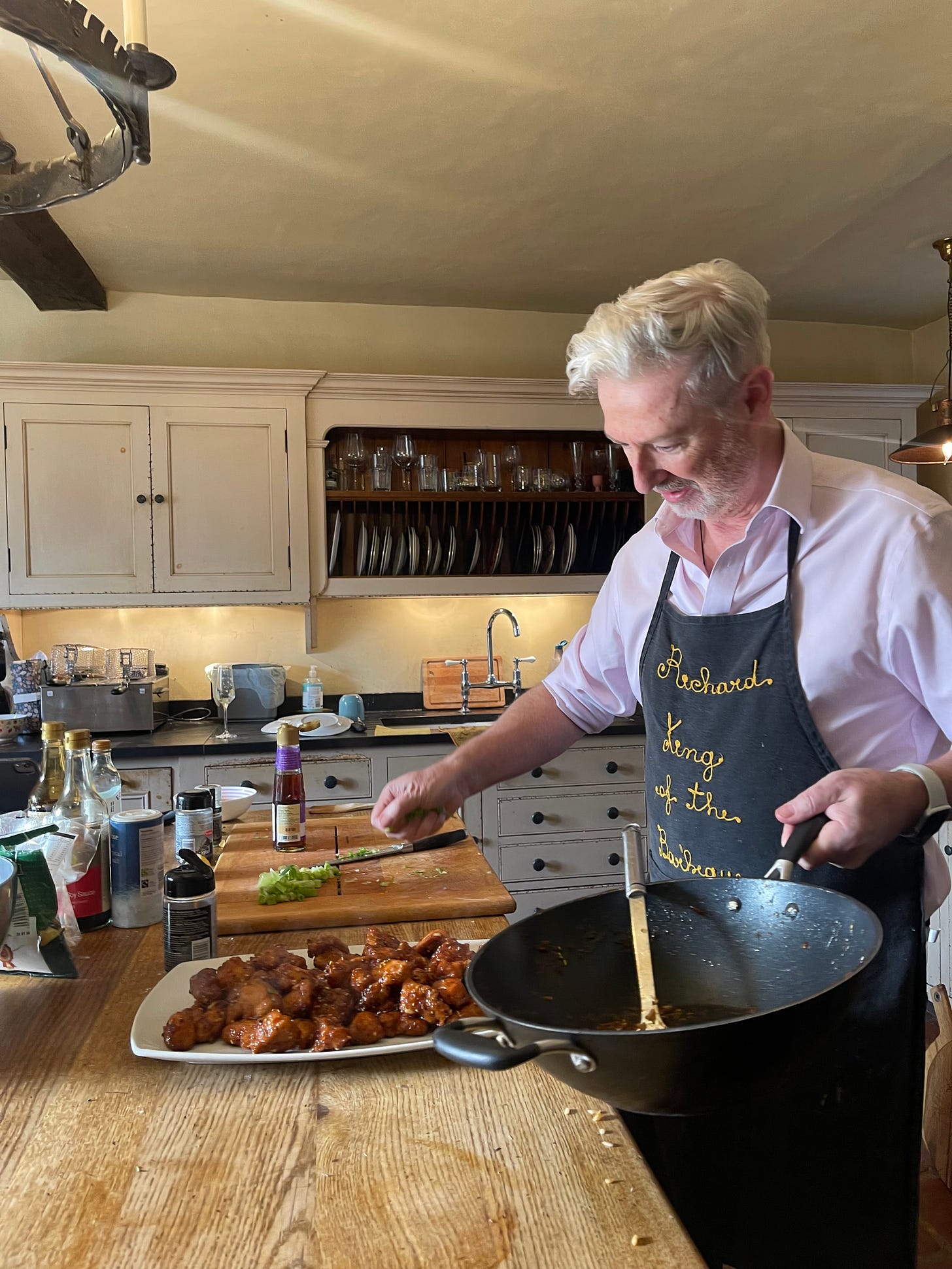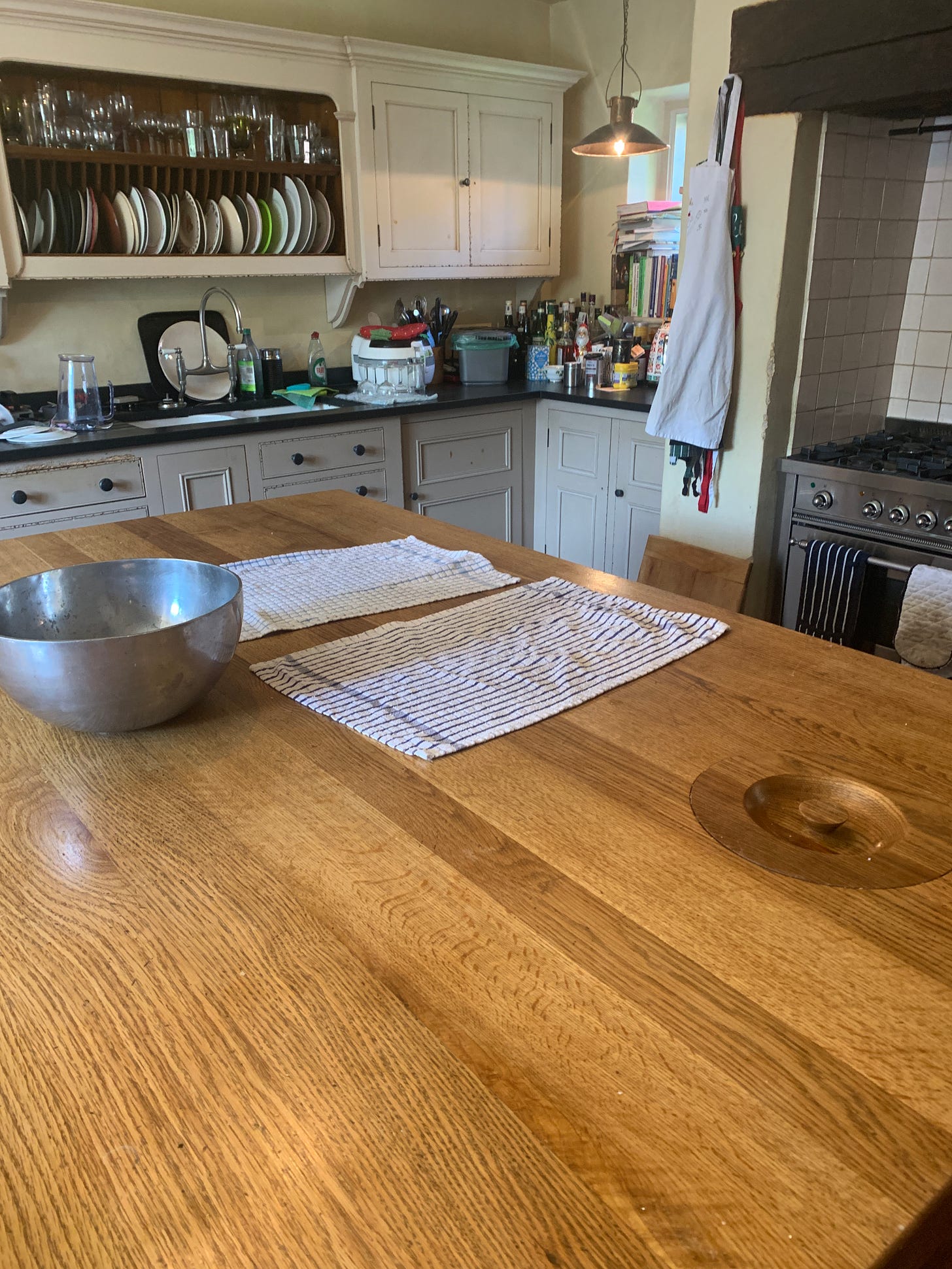Over the past 32 years, I've prepared around 30,000 meals—starting with just the three of us and growing to our full family of 11 when all our children were at home.
Fortunately, I love cooking.
What holds even greater significance for me, however, is my deep appreciation for tradition and ritual.
In a time when busy lifestyles make quick, solitary meals the norm, sitting down to share a meal with loved ones can seem like a rare luxury.
However, making time for this tradition has profound benefits that extend beyond the kitchen and dining room.
Sharing meals fuels us both physically and mentally. Ironically, despite the booming industries surrounding diet, nutrition, fitness, and TV cookery competitions, the tradition of preparing a meal from scratch and sharing it as a family has declined.
This is more than just a shame; it removes a valuable opportunity to develop our relationships, our sense of belonging, stability, and create frequent, shared memories.
My approach to cooking is quite ritualistic. Most weekday evenings during school and university term time, we eat together as a family of six. During the holidays, the number of people usually ranges from eight on weeknights to 12 on weekends, depending on who's around.
I steer clear of planning meals days in advance or doing batch cooking – partly because I dislike the word "batch". Other no-go expressions include fizz, bubbly, picky bits, nibbles, traybake, one pot dining, veg and veggies.
More importantly, I believe that planning every meal too far ahead or prepping food for days removes the joy of creating something fresh and new each day. When meals become just another task, they lose their charm. I don't want this to be just about feeding the hungry.
Instead, I like to think of each evening as a new culinary event that the whole family can anticipate with excitement. When my children come home, they always ask, "What's for supper, dad?". I love that.
As an aside, my routine will not suit everyone. I’m lucky enough to work from home, which allows me to start meal preparation early. The main point I want to emphasise is that making an effort to eat together as a family, whenever possible, is really worth doing.
For recipe inspiration, I draw from a range of sources, including my own experience. I have a variety of dishes in my repertoire, some of which I prepare each week, and different choices on the weekends. I change this over time and depending on the season.
In addition, I make yoghurt and almond milk every week for one of my daughters.
Over the years, I have amassed a large collection of cookbooks, clipped hundreds of recipes from newspaper articles and weekend magazines, and more recently, I have turned to YouTube, Instagram, and TikTok for new ideas.
One of my current favourite Instagram recipes is cauliflower "steak" served on a bed of puréed butter beans.
Because I am also interested in nutrition, I am conscious of the macronutrients I use in meal combinations.
In particular, I always include a significant amount of protein. I don't think most people eat enough protein, and I want to ensure my family get enough to avoid health issues related to inadequate protein intake.
However, I'm not overly strict about macros and ingredients, and I'm perfectly fine with my children enjoying so-called junk food from time to time.
The key is to ensure that they understand what they are consuming and what is optimal. They need to learn to make their own informed choices.
I usually begin preparing the meal at around 5:30 p.m. When the children were very young, we had a "cocktail time" ritual at 5 p.m. I'd arrange crisps, olives, vegetables, and hummus on a Lazy Susan, which marked the start of our evening and brought everyone together.
These days, I still start meal preparation early because my process involves an initial start-stop routine. Gradually, I gain momentum as I assemble the dishes.
I always make sure the work surface stays tidy while preparing the meal and make it a point to put away any unused ingredients. Untidy workspaces are a significant issue for me.
I try to get my children to do the same, encouraging them to clean up as they go along rather than leaving it all until the end.
Results have been mixed on that front, perhaps mirroring my wife Helena’s baking escapades! Although her cakes are wonderful.



Back to the stop-start. I like the routine of work, rest, work. I think it is useful to take short breaks to assess your progress and to relax a little.
As I'm sorting the dishes, I wash the used utensils and saucepans and put them away.
I want the work surface to be clear when I am ready to serve the meal. If we are having a meat dish, I typically make two main courses as Helena doesn't eat meat, except for Bresaola (go figure!).
I always complete the cooking on time. I dislike being late for anything and want to ensure that my family can always rely on meals being ready when I promise they will be.
Having a daily routine based on stability and certainty is a significant advantage for my children in a world that often feels chaotic.
No matter what happens at school or work, they can count on an evening meal made with care and attention, ready at the same time every day.
We typically have dinner at 7, just as our daughter gets home from work. She always texts me if she's going to be even five minutes late. Perhaps my passion for punctuality has rubbed off on the others! Hopefully, it's more out of consideration than fear.
After dinner, the children—some of whom are now young adults—chip in to help with the tidying up. I've always believed that after completing a task, you should leave the workspace looking untouched. This means ensuring the kitchen looks exactly as it did before I started preparing the meal.
While enjoying dinner, we chat about everything under the sun. We have always encouraged our children to think for themselves, to have opinions, and to engage in discussions about their day and world events. Nothing is out of bounds.
Sadly, this scenario isn't as common in our culture as it used to be. The fast-paced nature of modern life has significantly impacted traditional family gatherings around the dinner table.
Longer working hours, increased extracurricular activities, and the irresistible allure of smartphones all contribute to disrupting this valuable family time.
Convenience foods and fast delivery services further diminish the importance of home-cooked meals.
Busy families often choose faster, less nutritious options that need minimal preparation, reducing the time they can spend together.
This cultural shift impacts not just the quality of nutrition, but also weakens the family bonds that mealtimes used to nurture.
It's disheartening to hear that some of our children report that their friends eat alone in their rooms, which can obviously heighten feelings of isolation and diminish opportunities for family connections.
Regular family meals provide a fantastic opportunity for everyone to come together, creating an atmosphere of warmth and trust. Each shared meal becomes a moment for family members to catch up on their lives, discuss challenges, celebrate successes, and support each other through open conversations. And of course argue!
This rhythm and routine not only strengthens relationships but also fosters a sense of stability, dependability and encouragement.
Moreover, it enables parents and children to exchange roles, allowing children to share their opinions and feel appreciated. This, in turn, boosts their self-esteem and enhances overall family dynamics.
If you are not accustomed to eating together as a family and would like to, here are a few ideas:
Recognising that this is very important for you and your children is the starting point. If you treat it as a mere nicety rather than a necessity, it will never become a regular part of your life. Children are only young for such a fleeting period, so it's vital to cherish this precious time. My wife and I are unusual; by the time our youngest turns 18, we will have had children at home for a span of 35 years. For most families, this special time is more fleeting, so it's important to cherish it, as these moments will eventually come to an end.
Establish a regular dinner time that suits everyone, prioritising it in the family schedule. While it's understandable that some parents might need to work late, many choose to stay at the office longer or to socialise afterwards. If you find yourself in that habit, it's important to make an extra effort to leave work on time.
Start with small steps and keep it simple. There's no need to dive into something complicated right away. This way, you won't feel overwhelmed or tempted to give up. Take it easy and gradually build up over time.
Developing a repertoire of dishes and practicing adapting them can make your meals more interesting. I often cook a new recipe several times, not only to perfect it, but also to experiment and personalise it. Just be careful not to fall into the habit of repeating the exact same meals each week. Mixing up your recipes is essential to keep you and your family excited about mealtime.
If you can’t eat together most evenings, plan a family supper night and collaborate on the menu together, especially if you have older children. To avoid the dreaded scenario of "I don't mind what we have," make sure decisions are actually made. Someone might need to take charge to keep things moving. Let this tradition become a cherished part of your routine. You could even introduce fun themes, like "pasta night" (just remember, variety is key, so not every night).
If you're short on time, try planning ahead and stocking up on essentials just once a week. Despite my joke about batch cooking many people will need to have meals made in advance or ready to cook when they get back from work. It’s not easy, but with planning it can happen. Remember, it’s about what you are willing and able to prioritise. Once you develop a system, it will be much easier to stay on track. Systems make life run a lot smoother!
Create a comfortable and inviting space for dining. After all, it's not just about the food; it's about enjoying a fun experience that fosters conversation and creates happy memories. I've put together some music playlists that we enjoy in the background during meals. For years, my children had to listen to the film scores of "The Last Samurai" and "Kundun" every evening. Lately, I've diversified the playlists quite a bit!
Embrace flexibility. While maintaining consistency is important, it's equally crucial to adapt to changing schedules and unexpected events. Ultimately, you don't want your well-intentioned efforts to result in resentment.
Perseverance truly pays off. The rewards of regularly and frequently eating together are numerous and long-lasting. In our family's life, it has been one of our most cherished rituals. Commit today to making family meals a priority. Begin fostering meaningful connections, creating lasting memories, and establishing traditions that will enrich your family life for years to come.
Let's make family meals a cherished part of our lives again!
Thank you for taking the time to read this message. If you found it interesting, please consider sharing it with someone you believe would also find it valuable.







I grew up in a working class family where my dad worked hard to provide for his family but there was little family togetherness. Same simple meal every day of the week, eating in front of the telly, next-to-no family discussion week by week. Up until the age of 17 this is all I’d ever known and thought it was all very normal (which sadly it is!). At 17 the meeting of a lovely Christian family who embraced me into their home showed me a whole new way of conducting family life gave me new insight. A few years later when we started having our own family I was determined to do things completely differently to my own experience. It’s a joy to us now that our four grown-up daughters and husbands with 16 children between them endeavour to make the family meal the bedrock of their family life together. They are precious valuable times as you so clearly state. I fear more so for this present generation where technology now rules the roost. It’s leading to tragic, dysfunctional consequences in every sphere of life and culture, beginning with family life.
Richard,I have to confess that the idea of choice and variety at family mealtimes does amuse me a little as I remember back to when and where I grew up.
That old aphorism "Sometimes you get what you want,sometimes you get what you need but most of the time,you get what you get" still rings very true to me.
Maybe it was the same for you.
Let's just say that mince(sorry Helena) and potatos featured heavily on our Morrissey plat du jour.